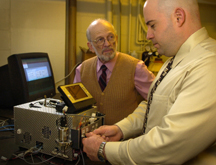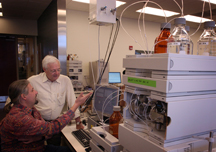

May 28, 2008
Purdue establishes center focused on analytical instrumentation; creates 'dream team' with regional universities
WEST LAFAYETTE, Ind. - |
The Center for Analytical Instrumentation Development will foster collaborations among the leading institutions in the field, including Purdue, the University of Illinois, Indiana University and the University of Notre Dame.
"Analytical chemistry and its instruments provide measurements and quantitative information underlying much of the research and commercial activity in chemistry, biology and medicine," said Purdue President France A. Córdova. "The leading scientists in the field are in America's heartland within a two-hour drive from one another, and this center will capitalize on the rich potential of our region."
Purdue's analytical chemistry program is ranked second in the nation, the University of Illinois is ranked third and Indiana University is ranked fourth, according to U.S.News and World Report.
 |
"Such 'dream team' partnerships will invigorate research endeavors and stimulate economic development in the region as brilliant ideas become reality," Córdova said.
Jeffrey S. Vitter, the Frederick L. Hovde Dean of the College of Science, said analytical instrumentation has led critical advances in science.
"Analytical instruments are the machine tools of science," he said. "The field has contributed numerous practical applications advancing science to meet changing societal needs. These instruments tell us everything from the structure of a molecule to the levels of lead in our drinking water. Recently, researchers developed the 'lab-on-a-chip,' a portable microchip a few centimeters in size that can perform multiple laboratory analyses with miniscule amounts of sample. The benefits to society will continue as this field enables others, such as nanotechnology and medicine, to progress rapidly."
Purdue's R. Graham Cooks, the Henry Bohn Hass Distinguished Professor of Chemistry, and Fred Regnier, the John H. Law Distinguished Professor of Chemistry, are co-directors of the center, which is located in the Bindley Bioscience Center at the university's Discovery Park.
Part of the center mission is to emphasize entrepreneurship and commercialization, Cooks said.
"Advances in instrumentation have applications in diagnosis and treatment of disease, miniaturization of technologies and detection of potential security threats," he said. "It is critical to see advancements through to end products available to those who need them. Many of the center members are involved with companies in the Purdue Research Park, and three have been awarded the outstanding commercialization award from the university."
The center will use Purdue's existing engineering prototyping program that quickly generates and distributes small batches of equipment to test the market.
Researchers are working to develop instruments that will allow millions of laboratory samples to be processed in minutes, as opposed to days under the current system, Regnier said.
"Current methodologies can't handle the number of analyses that need to be done, and we are facing a future crisis in health-care testing," he said. "The number of known indicators for disease and routine tests will continue to grow in leaps and bounds. Mass spectrometry and nanosensor-based devices will allow large-scale clinical analysis to keep up with the growing number of tests."
Future instruments also will allow testing to be done in the doctor's office and will provide results within minutes, Cooks said.
"Advances in instrumentation, such as imaging diagnostics and microscopic methods for analysis, will offer less invasive tests and earlier diagnosis of disease," he said. "Analytical instrumentation advances are critical to the future of health care."
Foreign connections also will play a key role in the center, and Purdue has been fostering a relationship with India, China, South Korea and Australia.
The Center for Analytical Instrumentation Development's launch symposium will be held from 9 a.m. to 5 p.m. June 18 in the Burton D. Morgan Center for Entrepreneurship, Room 121.
C.N.R. Rao, chemistry researcher and chairman of the Science Advisory Council to the prime minister of India, will present the keynote lecture of the symposium as part of the College of Science Centennial Lecture Series. Rao, a Purdue alumnus, is the Linus Pauling Research Professor and honorary president of the Jawaharlal Nehru Centre for Advanced Scientific Research in Bangalore.
In addition, faculty researchers Paul Bohn of the University of Notre Dame, Rashid Bashir of the University of Illinois and Stephen Jacobson of Indiana University will speak about instrumentation development in the region.
The symposium is free and open to the public. More information is available online at https://www.purdue.edu/dp/caid/
The Center for Analytical Instrumentation Development will draw upon Purdue's 70-year history in the field. It also will build on successful models such as the Jonathan Amy Facility for Chemical Instrumentation established at Purdue in 1968, the Indiana Instrumentation Institute and the Indiana Proteomics Consortium.
The new center will expand from these models to a much larger scale, Cooks said.
"This will be the first center to focus on instrumentation development that taps into the talent of an entire region," he said. "Eventually we hope to not only have researchers from other institutions working in rotating center positions here at Purdue, but also to have exchanges and center activities occurring at all of the institutions involved. It is time we cemented this region's reputation as a powerhouse in this field."
Purdue is contributing $500,000 a year for the first three years of center operation, and more than a half dozen proposals have already been submitted to funding agencies.
The center's first project will build instrumentation for early discovery, diagnosis and treatment of cancer. The center will formally begin work on July 1.
Writers: Elizabeth Gardner, (765) 494-2081, ekgardner@purdue.edu
Phillip Fiorini, (765) 496-3133, pfiorini@purdue.edu
Sources: R. Graham Cooks, (765) 494-5263, cooks@purdue.edu
Fred Regnier, (765) 494-3878, fregnier@purdue.edu
Jeffrey S. Vitter, (765) 494-1730, sciencedean@purdue.edu
Purdue News Service: (765) 494-2096; purduenews@purdue.edu
PHOTO CAPTION:
R. Graham Cooks, from left, Purdue's Henry Bohn Hass Distinguished Professor of Analytical Chemistry, works with former doctoral student Ismael Cotte-Rodriguez to review data after using a new miniature mass spectrometer to detect explosives. The portable instrument weighs approximately 22 pounds, is roughly the size of a shoebox and can be installed as part of a remote sensor network to monitor the air in subways, airports or office buildings. (Purdue News Service photo/David Umberger)
A publication-quality photo is available at https://www.purdue.edu/uns/images/+2008/cooks-CAID.jpg
PHOTO CAPTION:
Jiri Adamec, from left, a research assistant professor, discusses the results of an experiment with Fred Regnier, Purdue's John H. Law Distinguished Professor of Chemistry, in the Bindley Bioscience Center's Proteomics Lab. The team studies the detection and prediction of cancer through analysis of blood samples. (Purdue News Service photo/David Umberger)
A publication-quality photo is available at https://www.purdue.edu/uns/images/+2008/regnier-CAID.jpg
To the News Service home page
If you have trouble accessing this page because of a disability, please contact Purdue News Service at purduenews@purdue.edu.
